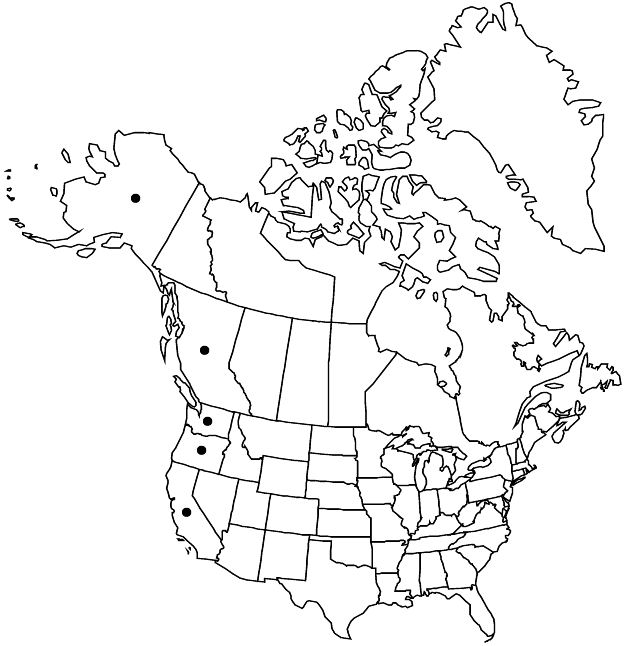Difference between revisions of "Potentilla gracilis var. gracilis"
FNA>Volume Importer |
FNA>Volume Importer |
||
| Line 25: | Line 25: | ||
|elevation=100–500(–1100) m | |elevation=100–500(–1100) m | ||
|distribution=B.C.;Alaska;Calif.;Oreg.;Wash. | |distribution=B.C.;Alaska;Calif.;Oreg.;Wash. | ||
| − | |discussion=<p>Variety gracilis is a relatively tall plant with serrate, narrow, strongly bicolor leaves, confined mainly to meadows west of the Cascade Mountains, from northwestern California northward through western Oregon to southern Washington. From there, an expression with increasingly broad leaflets transitional to <i></i>var.<i> fastigiata</i>, represented by <i>Potentilla</i> alaskana and P. blaschkeana, extends in the coastal mountains to southern Alaska.</p><!-- | + | |discussion=<p>Variety gracilis is a relatively tall plant with serrate, narrow, strongly bicolor leaves, confined mainly to meadows west of the Cascade Mountains, from northwestern California northward through western Oregon to southern Washington. From there, an expression with increasingly broad leaflets transitional to <i></i></i>var.<i><i> fastigiata</i>, represented by <i>Potentilla</i> alaskana and P. blaschkeana, extends in the coastal mountains to southern Alaska.</p><!-- |
| − | --><p>References to <i></i>var.<i> gracilis</i> from the Canadian prairie provinces (B. Boivin 1967–1979) correspond to the <i>Potentilla</i> filipes Rydberg extreme of <i>P. pulcherrima</i>. The two are superficially similar; <i></i>var.<i> gracilis</i> has more sharply and deeply serrate leaflets and lacks the conspicuous glands and contrasting leaflet veins of the latter. The inclusion of Saskatchewan in the range of <i></i>var.<i> gracilis</i> by H. J. Scoggan (1978–1979, part 3) is most likely based on <i></i>var.<i> flabelliformis</i> or its intergrades with other varieties.</p> | + | --><p>References to <i></i></i>var.<i><i> gracilis</i> from the Canadian prairie provinces (B. Boivin 1967–1979) correspond to the <i>Potentilla</i> filipes Rydberg extreme of <i>P. pulcherrima</i>. The two are superficially similar; <i></i></i>var.<i><i> gracilis</i> has more sharply and deeply serrate leaflets and lacks the conspicuous glands and contrasting leaflet veins of the latter. The inclusion of Saskatchewan in the range of <i></i></i>var.<i><i> gracilis</i> by H. J. Scoggan (1978–1979, part 3) is most likely based on <i></i></i>var.<i><i> flabelliformis</i> or its intergrades with other varieties.</p> |
|tables= | |tables= | ||
|references= | |references= | ||
| Line 50: | Line 50: | ||
|publication year= | |publication year= | ||
|special status= | |special status= | ||
| − | |source xml=https://jpend@bitbucket.org/aafc-mbb/fna-data-curation.git/src/ | + | |source xml=https://jpend@bitbucket.org/aafc-mbb/fna-data-curation.git/src/f6b125a955440c0872999024f038d74684f65921/coarse_grained_fna_xml/V9/V9_225.xml |
|subfamily=Rosaceae subfam. Rosoideae | |subfamily=Rosaceae subfam. Rosoideae | ||
|tribe=Rosaceae tribe Potentilleae | |tribe=Rosaceae tribe Potentilleae | ||
Revision as of 21:35, 24 September 2019
Stems (2–)4–10(–12) dm. Basal leaves: petiole (7–)10–25 cm, long hairs abundant, usually spreading, sometimes appressed, 0.5–2(–3) mm, stiff, crisped and cottony hairs usually absent, glands absent; leaflets (5–)7–9, ± separate, largest oblanceolate to narrowly obovate, 3–9 × (1.3–)1.5–3(–3.5) cm, margins flat to ± revolute, nearly whole length ± evenly incised 1/3–1/2 to midvein, undivided medial blade 5–12 mm wide, teeth 7–10(–11) per side, sometimes secondarily toothed, narrowly lanceolate to ovate, 3–8 mm, surfaces usually strongly dissimilar, abaxial white, sometimes grayish, long hairs abundant (mostly on veins), crisped-cottony hairs abundant to dense, rarely sparse, glands absent or sparse, adaxial green, straight hairs sparse, rarely absent, crisped and cottony hairs absent, glands absent. Flowers: epicalyx bractlets 3–5(–6) × 0.5–1.1 mm; hypanthium 4–6 mm diam.; petals (5–)7–10 × 5–12 mm; carpels 20–40, styles 2–3 mm. Achenes 1.2–1.8 mm.
Phenology: Flowering summer.
Habitat: Moist meadows, usually in oak and conifer woodlands
Elevation: 100–500(–1100) m
Distribution

B.C., Alaska, Calif., Oreg., Wash.
Discussion
Variety gracilis is a relatively tall plant with serrate, narrow, strongly bicolor leaves, confined mainly to meadows west of the Cascade Mountains, from northwestern California northward through western Oregon to southern Washington. From there, an expression with increasingly broad leaflets transitional to var. fastigiata, represented by Potentilla alaskana and P. blaschkeana, extends in the coastal mountains to southern Alaska.
References to var. gracilis from the Canadian prairie provinces (B. Boivin 1967–1979) correspond to the Potentilla filipes Rydberg extreme of P. pulcherrima. The two are superficially similar; var. gracilis has more sharply and deeply serrate leaflets and lacks the conspicuous glands and contrasting leaflet veins of the latter. The inclusion of Saskatchewan in the range of var. gracilis by H. J. Scoggan (1978–1979, part 3) is most likely based on var. flabelliformis or its intergrades with other varieties.
Selected References
None.